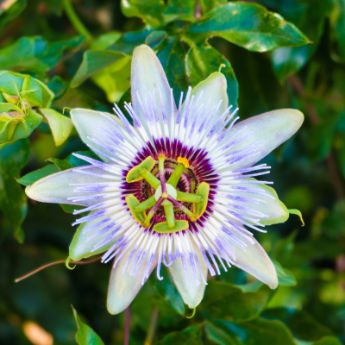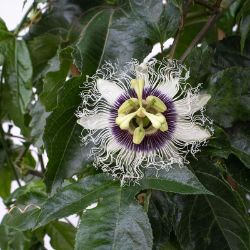Passion Fruit Vines
Passion Fruit Vines Buyer's Guide
Bring tropical beauty and bold flavor to your backyard with passion fruit vines—fast-growing climbers known for their fragrant flowers and sweet, aromatic fruit. These vigorous plants not only add visual interest and lush foliage to arbors, trellises, and fences, but also reward growers with highly nutritious fruit packed with vitamin C, fiber, and antioxidants.
We offer cultivars developed to thrive in warm climates. Whether you’re looking to grow in the ground or in a pot, these vines are a standout addition to edible landscapes, especially in USDA Zones 9–11.
Why Grow Passion Fruit Vines?
- Passion fruit delivers tropical flavor right from your garden
- Fragrant, showy blooms attract pollinators and add ornamental beauty
- Vines create natural privacy screens and shade
- Ideal for trellises, fences, or container growing in smaller spaces
- Grows quickly and produces fruit within a single growing season in ideal conditions
Choosing the Right Passion Fruit Vine for Your Garden
Zone Compatibility
Your local climate will determine whether you should plant your passion fruit vine directly in the ground or in a container. These plants are typically hardy in USDA Zones 9–11, where they can thrive year-round. In cooler climates, passion fruit vines should be grown in containers and brought indoors during winter, as they are sensitive to frost.
Pollination & Fruit Production
Most passion fruit varieties are self-pollinating, producing fruit with just one plant. However, growing multiple vines can boost fruit production. Flowers form on new growth, and fruit typically ripens 60–80 days after pollination. For optimal yields:
- Encourage pollination by planting in areas with bee activity
- Provide consistent moisture during bloom and fruit set
- Avoid heavy nitrogen fertilization, which can reduce flowering and fruiting
How to Grow Passion Fruit Vines
Passion fruit vines grow best with support and care. Follow these steps for healthy plants and a bountiful harvest:
- Site selection: Choose a location with full sun (at least 6–8 hours of direct light daily) and well-drained, fertile soil with a pH between 6.5 and 7.5
- Trellising: Provide a strong support system like a trellis, arbor, or fence—these vines are natural climbers and will need vertical space to thrive
- Soil prep: Mix compost or aged manure into the soil before planting to enrich it with nutrients
- Watering: Keep soil consistently moist but not soggy. Overwatering can lead to root rot, especially in containers
- Pruning: Prune vines every 2–3 months to encourage airflow, stimulate new growth, and manage size. Fruit only forms on new growth
- Fertilizing: Use a balanced, slow-release fertilizer sparingly. Too much nitrogen encourages foliage over fruit
- Container care: In cooler zones, grow in large containers (at least 15 gallons) and bring indoors when temperatures drop below 40°F. Provide a bright, sunny window or grow light for overwintering


